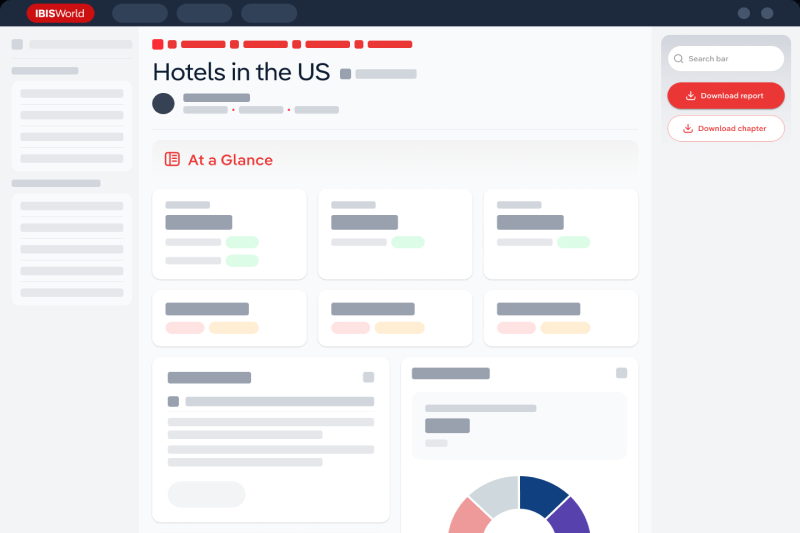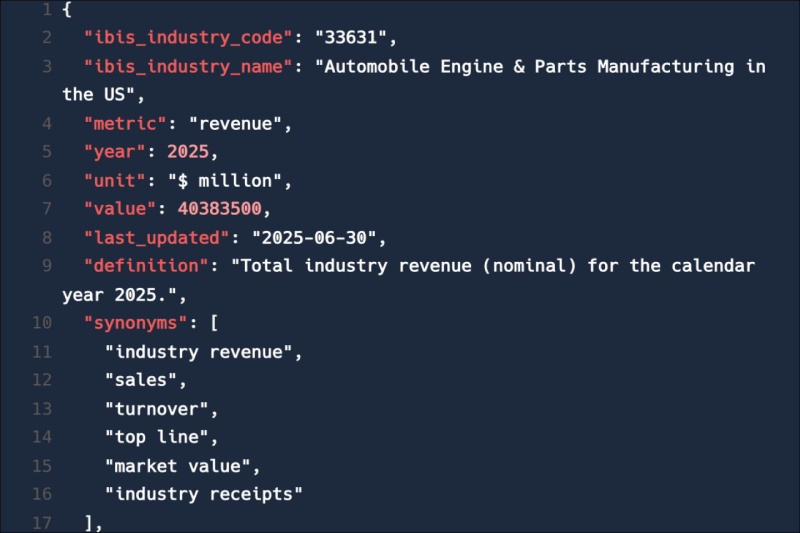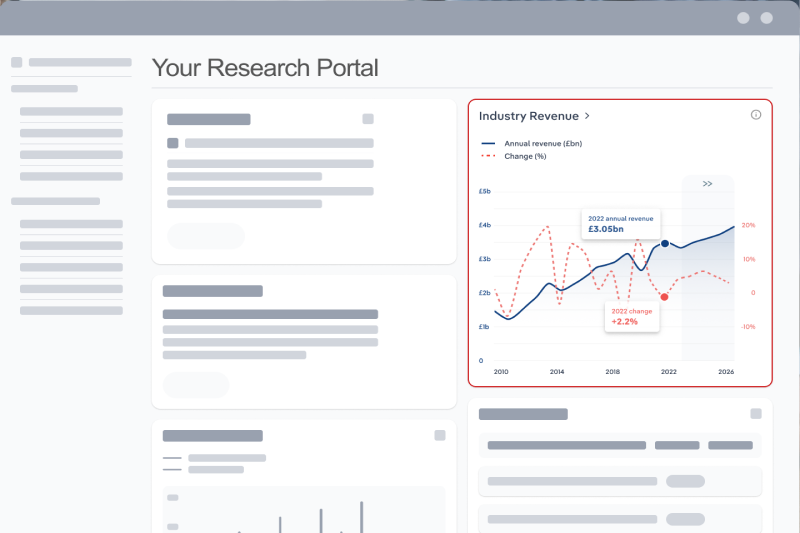IBISWorld Platform
Answer any industry question in minutes with our entire database at your fingertips.

The wood pallet and skids production industry has experienced significant growth over the past five years, driven primarily by robust consumer spending and pronounced volatility in lumber prices. Stimulus checks that expanded disposable income, alongside surges in construction and home improvement activity, fueled unprecedented demand for wood pallets, allowing producers to pass higher lumber costs to clients and maintain strong profitability. Although lumber prices have leveled off from 2022 peaks, they remain above pre-2020 levels, sustaining revenue at elevated heights as companies skillfully manage operational costs and navigate supply chain challenges. Revenue has been expanding at a CAGR of 7.0% over the past five years and is expected to reach $17.4 billion in 2025, when revenue will fall by an estimated 2.7%.

Answer any industry question in minutes with our entire database at your fingertips.

Feed trusted, human-driven industry intelligence straight into your platform.

Streamline your workflow with IBISWorld’s intelligence built into your toolkit.
IBISWorld's research coverage on the Wood Pallet & Skid Manufacturing industry in the United States includes market sizing, forecasting, data and analysis from 2016-2031. The most recent publication was released January 2026.
The Wood Pallet & Skid Manufacturing industry in the United States operates under the NAICS industry code 32192. Companies in the Wood Pallets and Skids Production industry manufacture wood pallets, wood box shook, wood boxes, wood skids, other wood containers and wood parts for pallets and containers. Companies purchase hardwood and softwood lumber from sawmills to manufacture this industry’s wood products. These products are then sold to a host of downstream industries that use the pallets and containers to store and transport consumer and industrial goods. Related terms covered in the Wood Pallet & Skid Manufacturing industry in the United States include dimension stock, shook, skids and radio-frequency identification (rfid).
Products and services covered in Wood Pallet & Skid Manufacturing industry in the United States include Wood boxes and crate shook, Recovered wood pallets and New wood pallets.
Companies covered in the Wood Pallet & Skid Manufacturing industry in the United States include Ufp Industries, inc.
The Performance chapter covers detailed analysis, datasets, detailed current performance, sources of volatility and an outlook with forecasts for the Wood Pallet & Skid Manufacturing industry in the United States.
Questions answered in this chapter include what's driving current industry performance, what influences industry volatility, how do successful businesses overcome volatility, what's driving the industry outlook. This analysis is supported with data and statistics on industry revenues, costs, profits, businesses and employees.
The Products and Markets chapter covers detailed product and service segmentation, analysis of major markets and international trade data for the for the Wood Pallet & Skid Manufacturing industry in the United States.
Questions answered in this chapter include how are the industry's products and services performing, what are innovations in industry products and services, what products or services do successful businesses offer and what's influencing demand from the industry's markets. This includes data and statistics on industry revenues by product and service segmentation and major markets.
The Geographic Breakdown chapter covers detailed analysis and datasets on regional performance of the Wood Pallet & Skid Manufacturing industry in the United States.
Questions answered in this chapter include where are industry businesses located and how do businesses use location to their advantage. This includes data and statistics on industry revenues by location.
The Competitive Forces chapter covers the concentration, barriers to entry and supplier and buyer profiles in the Wood Pallet & Skid Manufacturing industry in the United States. This includes data and statistics on industry market share concentration, barriers to entry, substitute products and buyer & supplier power.
Questions answered in this chapter include what impacts the industry's market share concentration, how do successful businesses handle concentration, what challenges do potential industry entrants face, how can potential entrants overcome barriers to entry, what are substitutes for industry services, how do successful businesses compete with substitutes and what power do buyers and suppliers have over the industry and how do successful businesses manage buyer & supplier power.
The Companies chapter covers Key Takeaways, Market Share and Companies in the Wood Pallet & Skid Manufacturing industry in the United States. This includes data and analysis on companies operating in the industry that hold a market share greater than 5%.
Questions answered in this chapter include what companies have a meaningful market share and how each company is performing.
The External Environment chapter covers Key Takeaways, External Drivers, Regulation & Policy and Assistance in the Wood Pallet & Skid Manufacturing industry in the United States. This includes data and statistics on factors impacting industry revenue such as economic indicators, regulation, policy and assistance programs.
Questions answered in this chapter include what demographic and macroeconomic factors impact the industry, what regulations impact the industry, what assistance is available to this industry.
The Financial Benchmarks chapter covers Key Takeaways, Cost Structure, Financial Ratios, Valuation Multiples and Key Ratios in the Wood Pallet & Skid Manufacturing industry in the United States. This includes financial data and statistics on industry performance including key cost inputs, profitability, key financial ratios and enterprise value multiples.
Questions answered in this chapter include what trends impact industry costs and how financial ratios have changed overtime.
The Industry Data chapter includes 10 years of historical data with 5 years of forecast data covering statistics like revenue, industry value add, establishments, enterprises, employment and wages in the Wood Pallet & Skid Manufacturing industry in the United States.
More than 6,000 businesses use IBISWorld to shape local and global economies
We were able to supplement our reports with IBISWorld’s information from both a qualitative and quantitative standpoint. All of our reporting now features some level of IBISWorld integration.

IBISWorld delivers the crisp business knowledge we need to drive our business. Whether it be serving up our major clients, winning new business or educating on industry issues, IBISWorld brings real value.

IBISWorld has revolutionised business information — which has proved commercially invaluable to exporters, investors and public policy professionals in Australia and overseas.

When you’re able to speak to clients and be knowledgeable about what they do and the state that they operate in, they’re going to trust you a lot more.

The market size of the Wood Pallet & Skid Manufacturing industry in the United States is $17.4bn in 2026.
There are 2,378 businesses in the Wood Pallet & Skid Manufacturing industry in the United States, which has grown at a CAGR of 1.0 % between 2021 and 2026.
The Wood Pallet & Skid Manufacturing industry in the United States is unlikely to be materially impacted by import tariffs with imports accounting for a low share of industry revenue.
The Wood Pallet & Skid Manufacturing industry in the United States is unlikely to be materially impacted by export tariffs with exports accounting for a low share of industry revenue.
The market size of the Wood Pallet & Skid Manufacturing industry in the United States has been growing at a CAGR of 7.0 % between 2021 and 2026.
Over the next five years, the Wood Pallet & Skid Manufacturing industry in the United States is expected to grow.
The biggest company operating in the Wood Pallet & Skid Manufacturing industry in the United States is Ufp Industries, inc.
Producing wood containers and boxes and Producing wood pallets are part of the Wood Pallet & Skid Manufacturing industry in the United States.
The company holding the most market share in the Wood Pallet & Skid Manufacturing industry in the United States is Ufp Industries, inc..
The level of competition is high and steady in the Wood Pallet & Skid Manufacturing industry in the United States.




